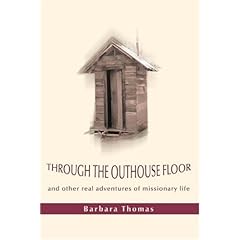 Here's a thought experiment for you.
Here's a thought experiment for you.What if Garrison Keillor and Erma Bombeck had a daughter, married her off to a former Navy Submariner, and sent them both to Africa to translate the Bible into a language that until recently had no written tradition?
You might wind up with a book as honest, compelling, and moving as Through the Outhouse Floor by Barbara Thomas.
In the preface of her charming memoir of a missionary family's life among the Komo people of Zaire, Thomas relates a conversation that informs the tone of all that follows. Soon after her arrival in Africa, she commiserated with a more experienced missionary about the inadequate preparation she had received for the difficulties of her new life. "Why didn't they tell us what it's really like?" The answer was that writing about the daily difficulties and anxieties of life in the mission field had always been considered an unseemly sign of weakness - an admission of human failings among people whose ministry can at times seem something more than human to those of us who choose to stay home in the land of iPods and liposuction. It has not been considered "fashionable" to talk about such mundane details.
Ms. Thomas' writing fills the void with rigorous honesty. She and her husband Paul both discerned a call to mission work early in their lives - before they had even met they wanted to carry the Gospel overseas. Once they were wed, they began the long preparation for work as linguists in Africa - translating the Bible into Komo.
This is a self-portrait without pretense. In their home, a case of Malaria is as common as a head-cold. She and her family are tormented by insects, bullies, international conflicts and local bureaucrats. Privacy seems non-existent. Surprise visitors appear in the windows, stroll through the front door, and invite themselves along on bone-jarring journeys over (usually) impassable roads. Komo hospitality is far less reserved than the kind practiced in the American Midwest of her youth, and Thomas is candid about resenting the imposition. At times she can appear to be peevish or even downright selfish.
Much of this modest author's power comes from her willingness to share her own flaws. That candor about the flesh's weakness helps us to trust her when she turns her attention to the spirit's strength.
But don't let the hardships fool you - this is a very funny book (its title comes from an anecdote about a decaying privy, after all.) In one scene after many years in the forest, she explains to her queasy visiting mother-in-law that the fat caterpillars her son has carried into the house taste just like lobster if you cook them right. In another, she and her husband, Paul share a romantic stroll under the setting African sun. In their hands they carry pails to collect dung for their garden. After a chilling night when Paul awakens to discover a burglar reaching through their bedroom window to steal their short-wave radio, the family acquires a fiercely protective German Shepherd and quite publicly names him Nkoki Bakukuba - "Biter of Thieves".
Through all these events, Thomas trusts in God's plan for her family and for the village of Lubutu that comes to be their home. She sees herself as a sort of a pioneer housewife quietly going about the business of raising a family while her husband does the important work of translating and preaching the gospel.
She says that she is writing to give people a realistic picture of the difficulties missionaries face and she succeeds, but her book shows us much more than that. Through the Outhouse Floor is a love story. Barbara Thomas loves her family. She loves the African people, and she loves God. She writes about love without sentiment and without lyricism, and in so doing takes us on an open-eyed journey of personal sacrifice and transformation that opens the mind, softens the heart, and gives the laugh muscles a good long workout.
As a 21st century liberal Christian, I am philosophically uncomfortable about missionaries. In a way, the entire enterprise smacks of paternal colonialism. Is is appropriate for the western church - so plagued by it's own deep flaws - to set about exporting our religion to other parts of the world? What makes our culture so superior to the ones we seek to transform?
Thomas leaves such theoretical meanderings to folks like me with nothing better to do. She is busy being a mother, wife, friend, neighbor, and citizen in a community where she is the only white woman for miles. She tends her garden, teaches her children, and comes to love and admire the Komo people whom God has called her to serve.
She sets out to be a missionary to the people of Zaire, and winds up being their sister in Christ. Now that's a mission even this left wing nut can get behind.
Peace,
Pennsy
